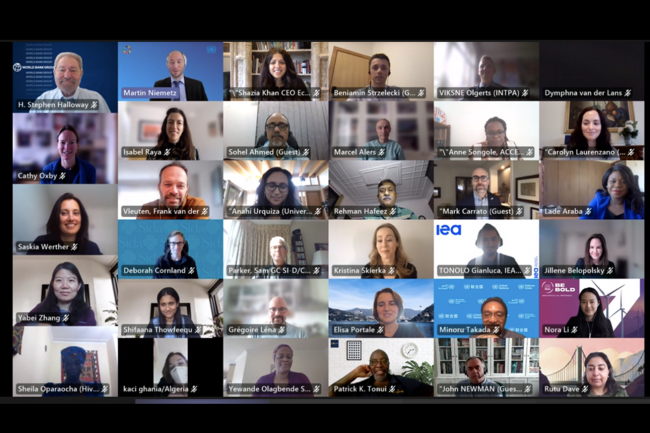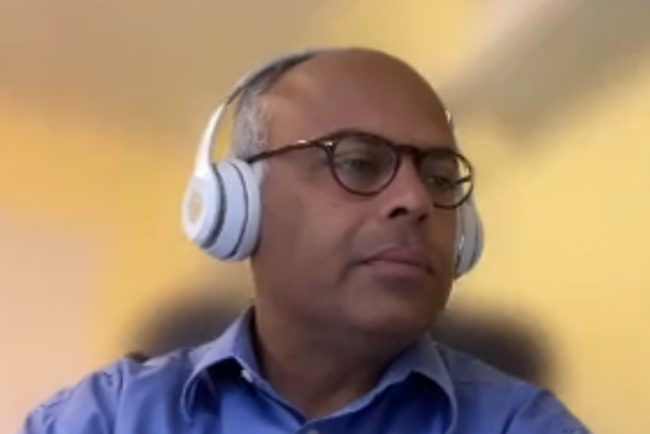The second meeting of the Technical Working Group on Energy Access focused on the draft report prepared by the group’s three co-leading entities: UN Development Programme (UNDP), the UN Office for Least Developed, Landlocked and Small Island Developing States (UN OHRLLS), and the World Bank.
Discussions addressed the need to increase access to clean cooking and electricity. Speakers called for recommendations regarding social inclusiveness to take a more central role in the draft report. Speakers also suggested identifying the transition pathways that are needed to achieve energy access, and emphasized the need for tiered solutions and examples of best practices.
The Working Group is one of five that are preparing a roadmap to be presented at the High-Level Dialogue on Energy in September 2021. The Technical Working Group on Energy Access first met on 24 February 2021 to provide initial input for the roadmap. The second virtual meeting took place on 19 April 2021, with the participation of 74 participants.
Presentation of Draft Report
Opening the meeting, Marcel Alers, Head of Energy, UNDP, said progress on energy access has been too slow and is not ambitious enough. He urged participants to think of how we can go beyond incremental change and identify the fundamental drivers for the lack of progress. He also called on participants to not let clean cooking issues get lost in a discussion of electricity access.
Rohit Khanna, ESMAP Manager, World Bank, presented the draft report and identified five challenges for energy access: inadequate development and/or suboptimal implementation of enabling policy and regulatory frameworks; deficient reliability, quality, and sustainability of energy services; untenable costs and affordability of energy services for target populations; insufficient and misdirected financing; and incomplete socio-economic inclusiveness.
He said the report’s overall recommendation is that clean cooking will need to be prioritized in political commitments and financing. For electricity, he said intensive and sustained efforts and financing are needed to leverage the potential of renewable energy mini-grid and off-grid solar technologies.
With regard to regulatory frameworks, he said policy frameworks supporting access to clean cooking are at an advanced level in only 15 percent of countries, and policies and regulations supporting electricity access have registered progress since 2010 but most countries still have not built robust policies.
On reliability, quality, and sustainability of energy services, he said mini-grids with higher quality of service are needed along with a larger number of countries that adopt off-grid solar international standards.
On costs and affordability of energy services, he said countries should have carefully designed financing mechanisms that are targeted to the poor and vulnerable.
On financing, he said there is a need for a step change in the flow of financing for clean cooking and electricity access, including for mini-grids.
On socio-economic inclusiveness, he said countries should set specific targets on socio-economic inclusiveness, and there should be an increased share of women entrepreneurs and employees in the energy access sector.
Discussion
The Technical Working Group split into three groups to exchange views on the draft report. Rapporteurs then reported back on the main points raised in each group during a discussion moderated by Heidi Schroderus-Fox, Director, UNOHRLLS.
Many speakers emphasized the need to bring the socio-economic considerations to the beginning of the report and to give a human face to energy access challenges. A wider focus on inclusion, displaced populations, considerations around youth, and capacity building, among other options, were proposed.
Speakers called for “telling the story differently.” For example, gender issues could be framed as questions of sustainable livelihoods rather than as women collecting firewood. Another speaker added framing around affordability and profitability in addition to livelihoods.
Participants called for providing examples of how specific actions can make a change, and for tailoring recommendations for specific stakeholders such as member states and the private sector. Many suggested including examples of good practices, with information on which countries have succeeded in driving up access at scale and implementing effective clean cooking solutions, and how it has been accomplished.
Speakers called for the report to include the transition pathways that are needed to achieve energy access. Many speakers said tiered solutions are needed, as energy access is not always an all or nothing approach.
The group was challenged to set clear targets on what it would take to address the regulatory gaps for increasing off-grid and mini-grid sources.
Speakers discussed the importance of country ownership for national plans to increase energy access. One speaker added this also means ministries will need to prioritize based on national objectives. Another noted that this issue hints at the insufficiency of political will to prioritize this issue. The need for coordination across ministries and at subnational as well as national levels was raised.
A participant asked where the group sees innovation happening in terms of solutions and geographically, to what extent inequality and fragility are a cause of the problem, and what the solutions are in those contexts.
A speaker highlighted the need to bring down costs on the technology side, and said pooled procurement provides an option. He pointed to the example of GAVI, an international vaccine alliance, and asked if a similar arrangement could be established for distributed renewables.
On financing, a speaker suggested using concessional capital in the right spots and allowing the private sector to react to the concessional capital. Speakers called for addressing the sustainability of subsidies.
A few speakers asked how electric utilities could be supported, noting they are often seen as the problem although they should be recognized as the workforce of the electric industry.
Speakers also highlighted the need to address:
- links between energy efficiency and energy access;
- issues related to energy access for youth; and
- the role of the public sector.
Some speakers also noted links between the energy access issue and energy compacts, with the latter being a way to move some of the issues under discussion forward.
During a focused Q&A on Clean Cooking moderated by Christelle Odongo-Braun, Energy and Climate Change Specialist, UNDP, speakers noted the need for an integrated approach. They suggested that we should ensure products are designed with the end user in mind. Another speaker said the layout of a kitchen and its ventilation can play an important role in whether cooking will produce indoor air pollution.
During a focused Q&A on Electrification moderated by Dana Rysankova, Senior Energy Specialist, World Bank, speakers suggested providing a regional and geographical focus on the challenges, with the greatest challenge being in fragile, rural areas. Disaggregated data, including on rural and indigenous communities, was called for.
Next Steps
Minoru Takada, Team Leader, Secretariat of the High-level Dialogue on Energy, DESA, highlighted that the two outputs of the High-level Dialogue on Energy would be a global roadmap to SDG 7 in 2030 and net-zero in 2050, which the Technical Working Groups’ reports will contribute towards, and energy compacts, which will comprise commitments for action.
He said the co-lead organizations will prepare executive summaries of the Technical Working Groups’ reports by 26 April. All experts in the Technical Working Groups will be encouraged to comment on all executive summaries during that week.
The Technical Working Group on Energy Access will hold its next meeting the week of 10 May.
To receive continuing coverage of this event delivered to your inbox, subscribe to the ENB Update newsletter.












